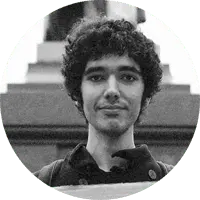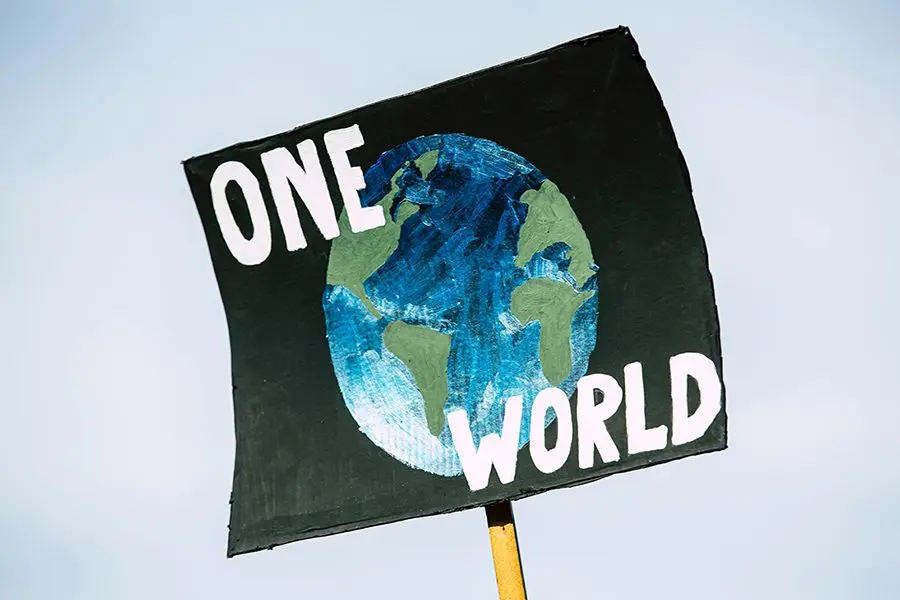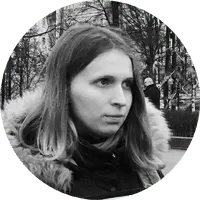
Ivan Drobotov, 24 years old
a graduate of the Russian Academy of National Economy and Public Administration, holds actions for separate collection of waste, goes to pickets, studied the situation with environmental protests of local residents in Shiyes:
I am definitely more conscious than my parents. However, they, and almost all of our fellow citizens, have a basic vague understanding that “ecology is important” – and more and more often this understanding translates into some kind of action. Both from sociological surveys and personal communication with people, I see that the environmental agenda is becoming more important for them, and they are increasingly willing to take part in positive changes. My parents, for example, started collecting and donating batteries.
I am not an ecologist by education, I am well versed only in the topic of waste management. Landfills are vast territories taken out of economic circulation, and large areas around them, where it is impossible to grow something edible and it is uncomfortable to live. Landfills also emit landfill gas. Sometimes they burn. If the landfill is not properly equipped, the leachate from it enters the groundwater and poisons nearby water sources. It’s just a bunch of resources that could have been put back into the economy, but instead ended up in a landfill.
Also, in my opinion, the issue of climate change is really important. In our country, it is not considered so relevant – they say, if it becomes a little warmer here, then it’s good, but someone else will be flooded with the sea. But it is important to understand that climate change can be expressed not only in warming, and that we are highly dependent on the global economy. Our country receives 17% of GDP from international transactions; there are simply no many consumer goods, products, medicines, technologies, machine tools in our country. If other countries suffer, we will inevitably suffer too. Climate change is a problem for everyone who lives on this planet, so everyone should solve it.
While ecosystems are degrading, we as a society are losing opportunities for development in the future, a lot of money and, more importantly, the health and years of people’s lives. With every day of delay, we lose even more. Let’s wait a little longer – and incredible efforts (and, again, money) will be required to stop the destruction of nature. Ecology today is an area where a small action can pay off a hundredfold and save lives, but this action is damn necessary right now.

Arshak Makichyan, 25 years old,
the violinist, a graduate of the Moscow Conservatory, goes on pickets; in 2019, together with Greta Thunberg, he participated in a UN conference:
I studied at the conservatory, I am a violinist. More than a year ago, I accidentally found out about the strikes for the climate, I was interested in this topic. Before that, I knew practically nothing about it, but I was already changing my environmental habits – I refused plastic, I became a vegetarian.
But I soon realized that simply by changing my habits, it would not be possible to prevent something terrible. I began to get angry at those close to me because they did not change their habits as quickly as I would like. Then I came to the conclusion that yes, I live in our country, and here they treat such things a little differently. I realized that I could also try to do something, and began to read about single pickets.
It is impossible, under the present system of things, to live in such a way as not to harm nature. I try not to drive cars, but I still ride the subway. And our energy is not green. No matter how much you try to limit yourself, you cannot but harm the planet. Therefore, we need changes at the state level.
When I started picketing, the topic of climate was practically not discussed in our country. I read a lot about climate and ecology, but everything was mostly in English. It is difficult to live in a society that does not understand that something important is happening. There was a feeling that our country was from another planet, while in Europe every Friday hundreds of thousands of people came out to protest, laws changed.
In Europe, issues of global climate change are discussed at school. For example, Greta Thunberg learned about these problems at school. And our young people do not know that something threatens their future. The main goal of the climate movement is to raise awareness of the consequences and threats of the climate crisis. Activism is when you yourself learn something and share your knowledge with others.
There are many theories about who is behind Greta and how such a huge movement came about in just one year. The answer to this question is obvious. The younger generation has learned to communicate much faster. We are changing much faster. The pace of life is accelerating. Today you can write one tweet and in a few hours it will be seen by millions. Young people have more opportunities and more free time to think about the future.

Andrey Rudnev, 23 years old,
student of the Ural Federal University, heads the Association of “green” universities in our country and the “Do” movement:
He started doing environmental projects at school thanks to a biology teacher. As a student, I went to the North Pole on a program for gifted students. Then he began to travel as a volunteer in the reserves, organized a detachment on the basis of his training group. We were in Murmansk, on Yamal, in Kabardino-Balkaria. This is where my work began.
Now young people are more conscious about the environment, about environmental protection. This activity is not for show, it comes from the heart. Performances, new design – it’s fashionable in a good way. Conservation activities are made fashionable. It comes to the realization that this is really cool, youthful and cool – and it also saves our planet.

I think we should approach this from a positive point of view. If something jars on us, it’s better to think about how we can fix it all, and not complain about the fact that all the waste is still being taken into one heap. I don’t understand why this myth resounds from all corners of our country?! It is in the youth that I see the strength that is ready to say: yes, everything is bad with us, but I am ready to fix it.
Now everyone actively supports environmental initiatives, so there is no need to prove their necessity. Everyone is drawn there and they don’t look at us as freaks. The problem is that there are so many projects that you do not have time to keep track of everything and participate in everything.
When I thought about my future after the association, there was a responsibility that all these young people should be united under a big slogan aimed at positive changes. Youth is the driver that can lead our country to rise.

Lyuba Samylova, 20 years old,
student of the Moscow City Pedagogical University, climate activist, participates in pickets:
Once I found an invitation from Greenpeace to a lecture about food waste. I don’t know why, but I went. I discovered a lot of new things for myself: for example, what is RSO and how to compost food waste – I grew up in big cities, where everything was thrown into one bucket.
My mom is quite supportive. She helped to organize Fridays for the future, because she has experience of interaction with the authorities, it is not difficult for her to take the notice to the mayor’s office. She follows the same lifestyle as me – separates waste, vegan.
I take my knowledge from social networks. If I want to study the issue in more detail, then I google in English, I try to find scientific articles, publications in the media. There is a lot of climate news and everything related to human rights in my information field. And there is anxiety and a feeling that you will not change anything. But you have to get out of this state. There are eco-anxiety groups. I met a psychologist from there, we had two online sessions – it helped me.
But I don’t have a sense of responsibility for my yard, my district. I’m more interested in global things in the context of the city, country and planet. But if you do nothing at the level of your yard, then it is difficult to talk about responsibility. There are things I can do myself, like separate waste, but I can’t force my neighbors to do the same. I think everyone sets their own boundaries. I try to take care of myself first.

Albina Niazbayeva, 20 years old,
student of Moscow State University, founded the “EcoGuild” at Moscow State University, manages the GreenUniverMos project, received the Moscow Government Prize for Ecology:
I believe that the main tool of the ecologist now is education and personal participation. We take to the streets and help others. The first thing to do on the way to an ideal world is to institutionalize various initiatives. The complex is important. If we collect garbage, but produce a lot of cars, nothing good will come of it. We will save ourselves from some diseases, but our airways will be affected.
I have a good academic base, so the first impulse is to teach people the right ecology. Greenwashing used to be unpopular, but greenwashing was. I wanted to show people that ecology is logical and easy to think about. I would like this millennium to be devoted to ecology, so that it stands next to healthcare, sports, and social activities.
When we started to engage in activism, the guys in my team mostly looked abroad, wanted to go on an internship or were already doing an internship in another country. Because in Europe and America, this agenda had been thundering for five years at that time.
Parents are one of the big stoppers of youth eco-organizations. I consoled more than one girl after her mother threw away bottle caps that had been accumulating for a long time. Conflict happens in 80%. Grandmothers, on the contrary, take everything well; The generation of our parents who have gained access to unlimited plastic, to a consumer society, does not just break patterns – there is a feeling that you are taking away a favorite toy from a child when you try to explain that this bottle can be washed and recycled.
The state agenda is now having a tremendous effect – two years ago, the doors were closed in front of us, and now they are waiting for us everywhere with open arms.










